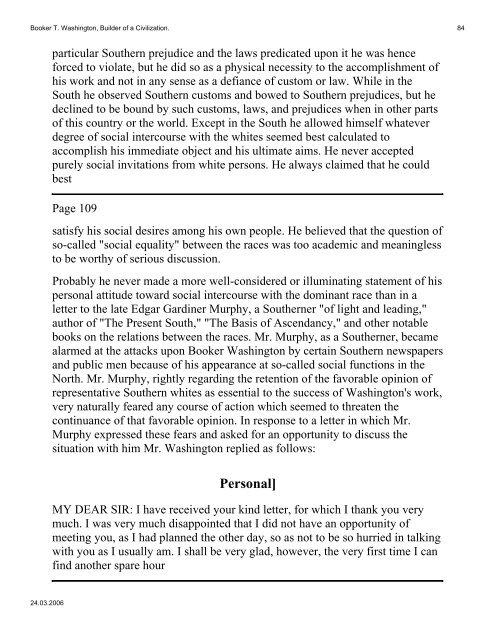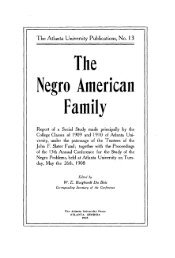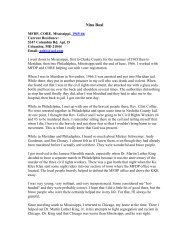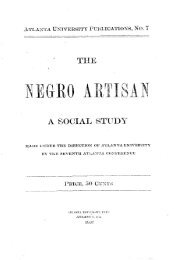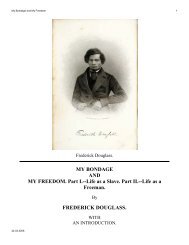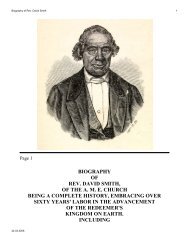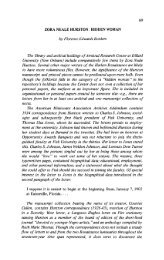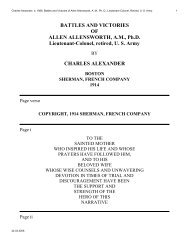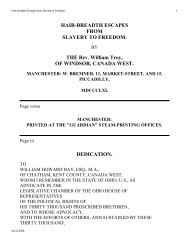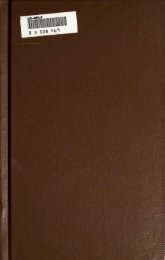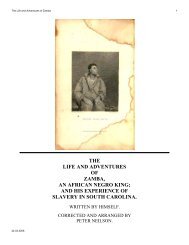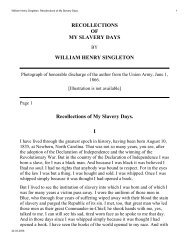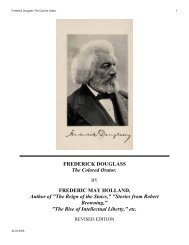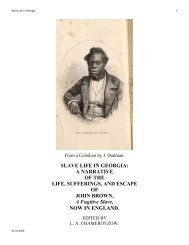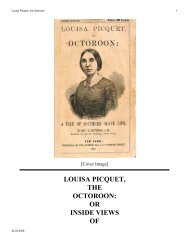Booker T. Washington, Builder o - African American History
Booker T. Washington, Builder o - African American History
Booker T. Washington, Builder o - African American History
You also want an ePaper? Increase the reach of your titles
YUMPU automatically turns print PDFs into web optimized ePapers that Google loves.
<strong>Booker</strong> T. <strong>Washington</strong>, <strong>Builder</strong> of a Civilization. 84<br />
particular Southern prejudice and the laws predicated upon it he was hence<br />
forced to violate, but he did so as a physical necessity to the accomplishment of<br />
his work and not in any sense as a defiance of custom or law. While in the<br />
South he observed Southern customs and bowed to Southern prejudices, but he<br />
declined to be bound by such customs, laws, and prejudices when in other parts<br />
of this country or the world. Except in the South he allowed himself whatever<br />
degree of social intercourse with the whites seemed best calculated to<br />
accomplish his immediate object and his ultimate aims. He never accepted<br />
purely social invitations from white persons. He always claimed that he could<br />
best<br />
Page 109<br />
satisfy his social desires among his own people. He believed that the question of<br />
so-called "social equality" between the races was too academic and meaningless<br />
to be worthy of serious discussion.<br />
Probably he never made a more well-considered or illuminating statement of his<br />
personal attitude toward social intercourse with the dominant race than in a<br />
letter to the late Edgar Gardiner Murphy, a Southerner "of light and leading,"<br />
author of "The Present South," "The Basis of Ascendancy," and other notable<br />
books on the relations between the races. Mr. Murphy, as a Southerner, became<br />
alarmed at the attacks upon <strong>Booker</strong> <strong>Washington</strong> by certain Southern newspapers<br />
and public men because of his appearance at so-called social functions in the<br />
North. Mr. Murphy, rightly regarding the retention of the favorable opinion of<br />
representative Southern whites as essential to the success of <strong>Washington</strong>'s work,<br />
very naturally feared any course of action which seemed to threaten the<br />
continuance of that favorable opinion. In response to a letter in which Mr.<br />
Murphy expressed these fears and asked for an opportunity to discuss the<br />
situation with him Mr. <strong>Washington</strong> replied as follows:<br />
Personal]<br />
MY DEAR SIR: I have received your kind letter, for which I thank you very<br />
much. I was very much disappointed that I did not have an opportunity of<br />
meeting you, as I had planned the other day, so as not to be so hurried in talking<br />
with you as I usually am. I shall be very glad, however, the very first time I can<br />
find another spare hour<br />
24.03.2006


